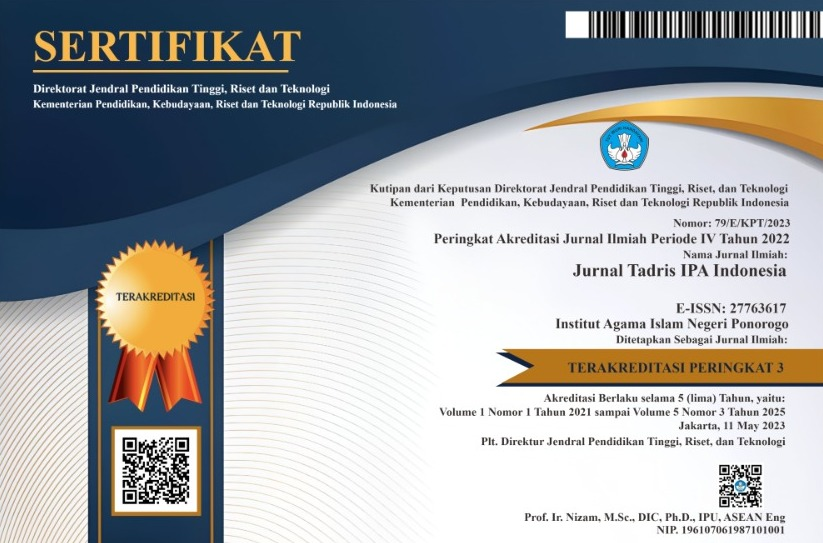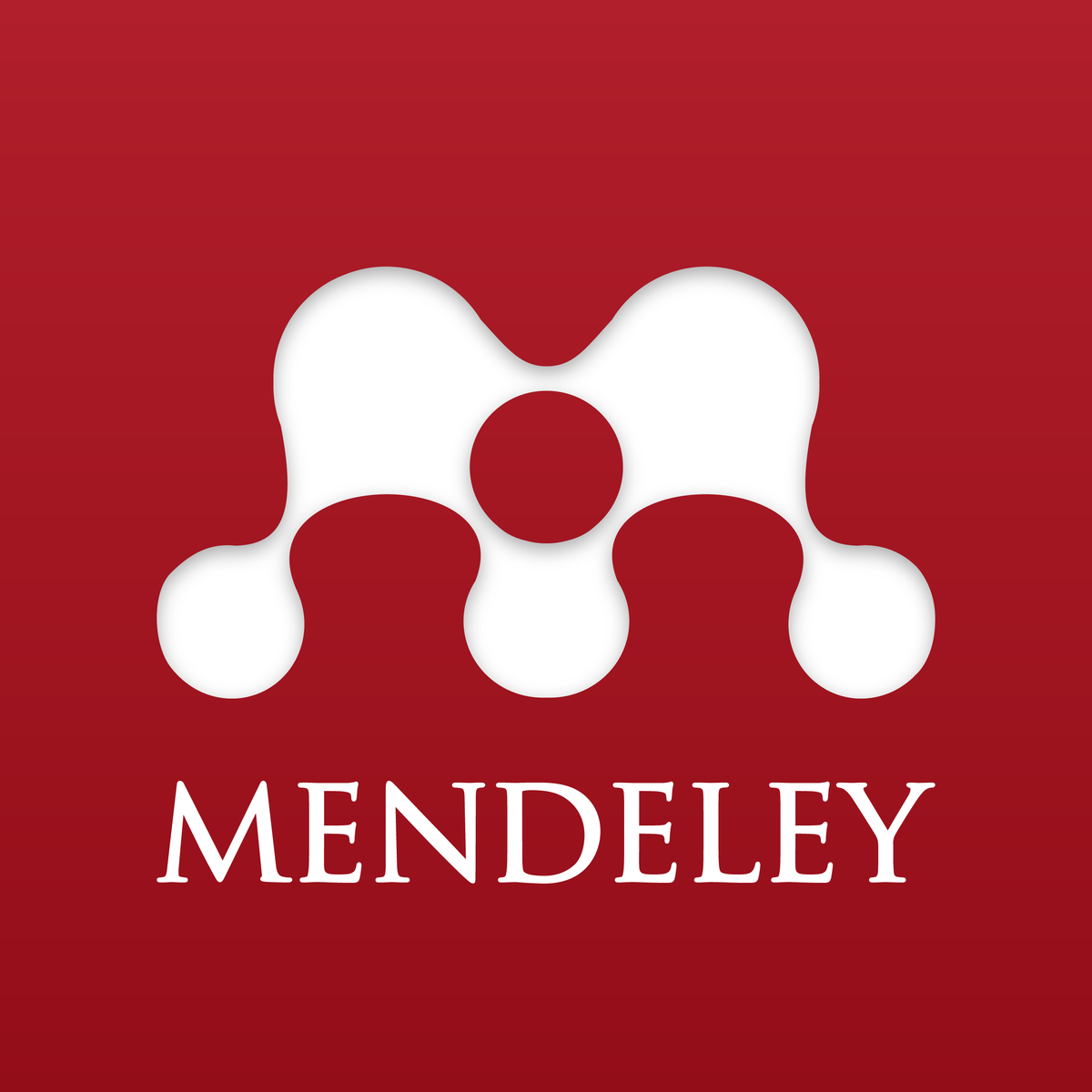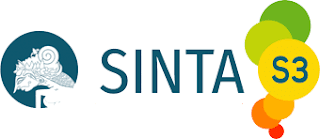PBL Berorientasi Literasi Sains dan Wawasan Penelitian Terhadap Peningkatan Kemampuan Berpikir Rasional Siswa
Abstract
Abstrak
Kemampuan berpikir rasional erat kaitannya dengan penyelesaian masalah dalam pembelajaran IPA. Hal tersebut selaras dengan tujuan pembelajaran IPA yaitu mampu menumbuhkan diri siswa lebih berperan aktif dalam pemahaman konsep sains dan penyelesaian permasalahan pada pembelajaran yang bermakna. Kemampuan berpikir rasional siswa masih dalam kategori rendah karena pembelajaran kurang interaktif. Maka dari itu dipilih PBL berorientasi literasi sains dan wawasan penelitian. Penelitian ini bertujuan untuk mengetahui efektivitas model PBL berorientasi sains dan wawasan penelitian terhadap kemampuan berpikir rasional siswa. Penelitian ini menggunakan pendekatan kuantitatif. Pengumpulan data dilakukan melalui lembar observasi, angket respon siswa dan soal tes. Analisis data yang dilakukan yaitu uji t serta ji cohen effect size. Hasil penelitian menunjukkan keterlaksanaan model PBL berorientasi literasi sains dan wawasan penelitian memperoleh nilai rata-rata 84,66%. Hasil dari angket respon siswa memperoleh respon baik dari siswa. Hasil dari uji-t two-tailed dengan nilai sig yakni 0,039 < 0,05 dan yakni 2,113 > 1,671 diketahui terdapat perbedaan kelas eksperimen dengan kelas kontrol. Hasil dari uji-t one-tailed yaitu P-Value sebesar 0,000 maka model PBL berorientasi literasi sains dan wawasan penelitian lebih efektif terhadap kemampuan berpikir rasional siswa dibanding dengan model pembelajaran konvensional. Hasil Uji cohen effect size diketahui bahwa efektivitas penerapan model PBL berorientasi literasi sains dan wawasan penelitian dalam pengaruh yang besar terhadap kemampuan berpikir rasional siswa.
Abstract
Rational thinking ability is closely related to problem-solving in science education. This is aligned with the goal of science education, which aims to foster students to be more actively engaged in understanding scientific concepts and solving problems in meaningful learning. However, students' rational thinking abilities are still categorized as low due to the lack of interactive learning. Therefore, PBL oriented towards science literacy and research insight was chosen. This research aims to determine the effectiveness of the PBL model oriented towards science literacy and research insight on students' rational thinking abilities. The research adopts a quantitative approach. Data collection was conducted through observation sheets, student response questionnaires, and test items. Data analysis included t-tests and Cohen's d effect size. The research results indicate that the implementation of the PBL model oriented towards science literacy and research insight achieved an average score of 84.66%. The student response questionnaire yielded positive feedback from the students. The two-tailed t-test with a significance value <α of 0.039 < 0.05 and t-valu > t-value of 2.113 > 1.671 showed a difference between the experimental and control groups. The one-tailed t-test resulted in a p-value of 0.000, indicating that the PBL model oriented towards science literacy and research insight is more effective in enhancing students' rational thinking abilities compared to conventional learning models. The Cohen's d effect size test revealed that the effectiveness of implementing the PBL model oriented towards science literacy and research insight has a significant impact on students' rational thinking abilities.
References
Afdila, Nur. 2020. “A Secondary School Student’s Critical Thinking Ability Profile in Natural Science Subject Matters Based on Learning Style.” INSECTA: Integrative Science Education and Teaching Activity Journal 1 (2). https://doi.org/10.21154/insecta.v1i2.2230.
Amin, Saiful, Sugeng Utaya, Syamsul Bachri, Sumarmi, and Singgih Susilo. 2020. “Effect of Problem-Based Learning on Critical Thinking Skills and Environmental Attitude.” Journal for the Education of Gifted Young Scientists 8 (2): 743–55. https://doi.org/10.17478/jegys.650344.
Anisa, L, M Martini, and E Susiyawati. 2020. “Meningkatkan Kemampuan Literasi Sains Siswa Melalui Pembelajaran Ipa Berbasis Socio-Scientific Issues Pada Materi Zat Aditif.” Pensa: E-Jurnal … 10 (2): 260–65.
Cahyani, Anggy Ardiya, Faninda Novika Pertiwi, Arinta Windiyanti Rokmana, and Izza Aliyatul Muna. 2021. “Efektivitas Model Learning Cycle 5E Berbasis Literasi Sains Terhadap Kemampuan Bertanya Peserta Didik.” Jurnal Tadris IPA Indonesia 1 (2): 249–58. https://doi.org/10.21154/jtii.v1i2.184.
Carvalho, Graça S., Rosa Branca Tracana, Grita Skujiene, and Jurga Turcinaviciene. 2011. “Trends in Environmental Education Images of Textbooks from Western and Eastern European Countries and Non-European Countries.” International Journal of Science Education 33 (18): 2587–2610. https://doi.org/10.1080/09500693.2011.556831.
Hamid, Abd. 2019. “Berbagai Metode Mengajar Bagi Guru Dalam Proses Pembelajaran.” Jurnal Penelitian Sosial Dan Keagamaan 9 (2): 1–16.
Handayani, Zulham, A. Halim, and Ibnu Khaldun. 2021. “The Impact of Handbooks on the Concept Understanding and Learning Interests of Students on the Concept of Reaction Rate.” Jurnal Penelitian Pendidikan IPA 7 (2): 239. https://doi.org/10.29303/jppipa.v7i2.628.
Harlow, Danielle B., Lauren H. Swanson, and Valerie K. Otero. 2014. “Prospective Elementary Teachers’ Analysis of Children’s Science Talk in an Undergraduate Physics Course.” Journal of Science Teacher Education 25 (1): 97–117. https://doi.org/10.1007/s10972-012-9319-7.
Hendrayana, Sopyan. 2017. “Meningkatkan Keterampilan Berpikir Rasional Siswa Melalui Model Sains Teknologi Masyarakat Pada Konsep Sumber Daya Alam.” Pendas : Jurnal Ilmiah Pendidikan Dasar 2 (1): 73. https://doi.org/10.23969/jp.v2i1.471.
Holbrook, Jack, and Miia Rannikmae. 2017. “The Nature of Science Education for Enhancing Scientific Literacy.” International Journal of Science Education 29 (11): 1347–62. https://doi.org/10.1080/09500690601007549.
Kähler, Jana, Inga Hahn, and Olaf Köller. 2020. “The Development of Early Scientific Literacy Gaps in Kindergarten Children.” International Journal of Science Education 42 (12): 1988–2007. https://doi.org/10.1080/09500693.2020.1808908.
Kartini, Dewi, Ai Nurul Nurohmah, Dwi Wulandari, and Prihantini Prihantini. 2022. “Relevansi Strategi Pembelajaran Problem Based Learning (PBL) Dengan Keterampilan Abad 21.” Jurnal Pendidikan Tambusai 6 (2): 9092–99.
Klucevsek, Kristin M., and Allison B. Brungard. 2016. “Information Literacy in Science Writing: How Students Find, Identify, and Use Scientific Literature.” International Journal of Science Education 38 (17): 2573–95. https://doi.org/10.1080/09500693.2016.1253120.
Lutfirohmatika, Ikfina, and Faninda Novika Pertiwi. 2021. “Efektivitas Model Pembelajaran VAK (Visualization, Auditoy, and Kinestetics) Dengan Pendekatan Literasi Sains Terhadap Kemampuan Presentasi Peserta Didik MTS Kelas VII.” Jurnal Tadris IPA Indonesia 1 (3): 282–91. https://doi.org/10.21154/jtii.v1i3.202.
Mawikere, Marde Christian Stenly. 2022. “Model-Model Pembelajaran.” EDULEAD: Journal of Christian Education and Leadership 3 (1): 133–39. https://doi.org/10.47530/edulead.v3i1.91.
Muzayyinah. 2011. “Seminar Nasional VIII Pendidikan Biologi 197.” Seminar Nasional VIII Pendidikan Biologi 15, no. 1: 16–34. http://jurnal.fkip.uns.ac.id/index.php/prosbio/article/download/748/416.
Ni’mah, Saidatun. 2016. “Lembar Kerja Mahasiswa Berbasis Inkuiri Terbimbing Untuk Meningkatkan Keterampilan Proses Sains Mahasiswa.” Lentera: Jurnal Pendidikan 11 (2): 70–79. https://doi.org/10.33654/jpl.v11i2.414.
Ploj Virtič, Mateja. 2022. “Teaching Science & Technology: Components of Scientific Literacy and Insight into the Steps of Research.” International Journal of Science Education 44 (12): 1916–31. https://doi.org/10.1080/09500693.2022.2105414.
Pratiwi, S.N., C. Cari, and N. S. Aminah. 2019. “Pembelajaran IPA Abad 21 Dengan Literasi Sains Siswa.” Jurnal Materi Dan Pembelajaran Fisika 9 (1): 34–42.
Putri, Ersa Amalia, and Wirawan Fadly. 2022. “Analysis Of Student’s Rational Thinking Ability In A Career Perspective In The Field Of Science, Technology, Engineering, Mathematics (STEM).” INSECTA: Integrative Science Education and Teaching Activity Journal 3 (2): 127–39. https://doi.org/10.21154/insecta.v3i2.5138.
Rauf, Indriyani, Irvin Novita Arifin, and Rifda Mardian Arif. 2022. “Pengaruh Model Problem Based Learning Terhadap Kemampuan Berpikir Kritis Siswa.” PEDAGOGIKA, 163–83. https://doi.org/10.37411/pedagogika.v13i2.1354.
Rodriguez, Alberto J., Sheron Mark, and Christina Restrepo Nazar. 2022. “Gazing Inward in Support of Critical Scientific Literacy.” Journal of Science Teacher Education 33 (2): 125–30. https://doi.org/10.1080/1046560X.2021.2009973.
Ruli, Efrianus, and Endang Indarini. 2022. “Meta Analisis Pengaruh Model Pembelajaran Problem Based Learning Terhadap Kemampuan Berpikir Kritis Dalam Pembelajaran Matematika Di Sekolah Dasar.” Jurnal Pendidikan Dan Konseling 4 (5): 221–28. https://core.ac.uk/download/pdf/322599509.pdf.
Sakamoto, Miki, Etsuji Yamaguchi, Tomokazu Yamamoto, and Kazuya Wakabayashi. 2021. “An Intervention Study on Students’ Decision-Making towards Consensus Building on Socio-Scientific Issues.” International Journal of Science Education 43 (12): 1965–83. https://doi.org/10.1080/09500693.2021.1947541.
Sari, Rati Melda. 2019. “Analisis Kebijakan Merdeka Belajar Sebagai Strategi Peningkatan Mutu Pendidikan.” PRODU: Prokurasi Edukasi Jurnal Manajemen Pendidikan Islam 1 (1): 38–50. https://doi.org/10.15548/p-prokurasi.v1i1.3326.
Septariani Isnain, Anita, Edi Irawan, Rahmi Faradisya Ekapti, Ulinnuha Nur Faizah, and Riwayat Artikel. 2021. “Efektivitas Model Pembelajaran Discovery-Inquiry Berbantuan Mind Mapping Dalam Meningkatkan Kemampuan Berpikir Rasional Peserta Didik.” Jurnal Tadris IPA Indonesia 1 (3): 314–22. http://ejournal.iainponorogo.ac.id/index.php/jtii.
Sholikhah, Khoirotus, Edi Irawan, and Tommy Tanu Wijaya. 2023. “Integrative Science Education and Teaching Activity Journal Exploring the Transformative Effect of Problem-Based Learning Models in Science , Technology , Engineering , and Mathematics on Students â€TM Rational Thinking Ability across Gender” 4 (1): 52–63.
Stanovich, Keith E. 2016. “The Comprehensive Assessment of Rational Thinking.” Educational Psychologist 51 (1): 23–34. https://doi.org/10.1080/00461520.2015.1125787.
Sugiyono. 2018. “Sugiyono Metode Penelitian Kuantitatif Kualitatif.” Metode Penelitian Kuantitatif Kualitatif, 6.
Widyastika, Dinda, Rudi Hermansyah Sitorus, and Syibrina Jihan Lubis. 2022. “Literasi Sains Dan Pendidikan Karakter Pada Pembelajaran IPA Abad 21.” Journal on Teacher Education 3: 302–9.
Zahro, Addiliya Vida Dewi, and Sofwan Hadi. 2022. “Meningkatkan Kemampuan Berpikir Rasional Peserta Didik Melalui Model Pembelajaran Children Learning In Science (CLIS) Berbantuan Mind Mapping.” Jurnal Tadris IPA Indonesia 2 (2): 159–70. https://doi.org/10.21154/jtii.v2i2.793.
Copyright (c) 2024 Emi Zulfa Faridah, Faninda Novika Pertiwi

This work is licensed under a Creative Commons Attribution-NonCommercial-ShareAlike 4.0 International License.
Jurnal Tadris IPA Indonesia allow the author(s) to hold the copyright without restrictions and allow the author(s) to retain publishing rights without restrictions, also the owner of the commercial rights to the article is the author.








